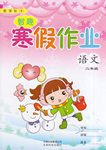
【题目】下列加线字的注音完全正确的一项是
A.水龙吟(yín) 永遇乐(lè) 揾英雄泪(ǎo)
B.孙仲谋(móu) 求田问舍(shě) 可堪回首(kān)
C.供恨(gong 佛狸祠(Cí) 居胥(xū)
D.倩何人(qiàn) 舞榭歌台(xiè) 英雄无觅(mì)
 智趣寒假作业云南科技出版社系列答案
智趣寒假作业云南科技出版社系列答案科目:高中地理 来源: 题型:
【题目】—Silly me! I forget what my luggage looks like.
—What do you think of __________ over there?
A. the one
B. this
C. it
D. that
查看答案和解析>>
科目:高中地理 来源: 题型:
【题目】The tree over there is so tall that I suppose it _______ nearly twenty metres.
measures
is measured
measure
to be measured
查看答案和解析>>
科目:高中地理 来源: 题型:
【题目】阅读下面这首词,完成下列各题。
醉翁操【1】
苏轼
琅然,清圆,谁弹?响空山。无言,惟翁醉中知其天。月明风露娟娟,人未眠。荷蒉过山前,曰有心也哉此贤【2】。 醉翁啸咏,声和流泉。醉翁去后,空有朝吟夜怨。山有时而童巅【3】,水有时而回川。思翁无岁年,翁今为飞仙。此意在人间,试听徽外三两弦【4】。
注释:【1】据本词序,欧阳修喜爱琅琊幽谷的山川奇丽、泉鸣空涧,常把酒临听,欣然忘归。后沈遵作琴曲《醉翁操》,崔闲记谱,请苏轼填词。【2】蒉:草筐。《论语·宪问》:“子击磬于卫,有荷蒉而过孔氏之门者,曰:‘有心哉,击磬乎!’”【3】童巅:山顶光秃,山无草木曰童。【4】徽:琴徽,系弦之绳。此处代指琴。
【1】下列对本词的理解,不正确的一项是( )
A.“响空山”与王维《山居秋暝》“空山新雨后”的“空山”,都写出了山的空寂。
B.“荷蒉”两句以《论语》中荷蒉者对孔子击磬的评价,赞赏醉翁懂得鸣泉之妙。
C.“醉翁去后”两句描写醉翁离开琅琊后,作者空对流泉,以吟诵表达思念之情。
D.词作最后三句是说醉翁虽已离世,声和流泉的美妙意境却仍然得以留存人间。
【2】词作开篇几句运用了以声写声的手法,用玉声形容泉声的清亮圆润。按照要求,完成下列各题。
① 下列诗句,没有运用这种手法的一项是( )
A.龙吟虎啸一时发,万籁百泉相与秋。(李颀《听安万善吹觱篥歌》)
B.商声寥亮羽声苦,江天寂历江枫秋。(刘长卿《听笛声留别郑协律》)
C.蜂簇野花吟细韵,蝉移高柳迸残声。(韦庄《听赵秀才弹琴》)
D.寒敲白玉声偏婉,暖逼黄莺语自娇。(王仁裕《荆南席上咏胡琴妓》)
② 在横线处填写作品原句。
白居易《琵琶行》同样运用了这种手法来写琵琶声:“_______________,___________________。间关莺语花底滑,幽咽泉流冰下难。”
【3】在横线处填写作品原句。
① 古代文人常常喜欢“啸咏”,除了本词中的醉翁,陶渊明写曾写道:“_______________,___________________。聊乘化以归尽,乐夫天命复奚疑!”(《归去来兮辞》)
② 这首词与欧阳修《醉翁亭记》有密切关联。词中“唯醉翁中知其天”“醉翁啸咏,声和流泉”,呼应了《醉翁亭记》中“醉翁之意不在酒,在乎山水之间也”“_______________,___________________”等寄情山水的名句。
【4】欧阳修《醉翁亭记》描写了琅琊山的四时景色,表现了作者以山水自适、与民同乐的情怀。与之相比,苏轼这首《醉翁操》所描写的景色和表现的情怀有何不同?
查看答案和解析>>
科目:高中地理 来源: 题型:
【题目】 The report __________ that all children be treated equally.
A. suspected
B. said
C. urged
D. assessed
查看答案和解析>>
科目:高中地理 来源: 题型:
【题目】I’m Sorry, I Won’t Apologize
Almost daily,news reports include accounts of public figures or heads of companies being forced to say they're sorry. In a recent case,Marge Schott,managing partner of the Cincinnati Reds,at first did not want to apologize for her remark that Hitler "was good at the beginning but he just went too far. "Under pressure,she finally said that she regretted her remarks "offended many people". Predictably — and especially given her history with such comments — many were not satisfied with this response and successfully lobbied for her resignation.
This particular use of "I'm sorry" has a familiar ring. The other day my husband said to me,"I'm sorry I hurt your feelings." I knew he was really trying. He has learned,through our years together,that apologies are important to me. But he was grinning,because he also knew that "I'm sorry I hurt your feelings" left open the possibility — indeed,strongly suggested — that he regretted not what he did but my emotional reaction. It sometimes seems that he thinks the earth will open up and swallow him if he admits fault.
It may appear that insisting someone admit fault is like wanting him to humiliate himself. But I don't see it that way,since it's no big deal for me to say I made a mistake and apologize. The problem is that it becomes a big deal when he won't.
This turns out to be similar to the Japanese view. Following a fender bender,according to a Times article,the Japanese typically get out of their
The Japanese driver and I are not the only ones who are offended when someone obviously at fault doesn't just fess up and apologize. A woman who lives in the country told me of a similar reaction. One day she gave her husband something to mail when he went into town. She stressed that it was essential the letter be mailed that day,and he assured her it would. But the next day,when they left the house together,she found her unmailed letter in the car. He said,"Oh,I forgot to mail your letter." She was furious — not because he had forgotten,but because he didn't apologize.
【1】What was Marge Schott forced to do?
A. To make a prediction of the future.
B. To say "Hitler was good at the beginning."
C. To say "Im sorry."
D. To count figures.
【2】 The author felt _____ .
A. her husband regretted the choice he had made
B. her husband regretted what he did
C. her husband regretted her emotional response
D. her husband regretted the dirty words he had used
【3】 According to the author,when one makes a mistake,he should _____ .
A. admit it and apologize
B. avoid admitting it
C. wxplain it away
D. make every effort to maintain his face
【4】According to the passage,what would Japanese drivers usually do after a car accident?
A. They would admit their own faults.
B. They would blame each other.
C. They would avoid admitting faults
D. They would sue each other.
【5】 What does the underlined word “furious” in the last paragraph mean?
A. Angry
B. Surprised
C. Crazy
D. Mad
查看答案和解析>>
科目:高中地理 来源: 题型:
【题目】The football player had ________ gift for football when he was a child. Now he is ________ second to none in the football field.
the; the
the; a
a; the
a; /
查看答案和解析>>
科目:高中地理 来源: 题型:
【题目】—How much do you know about the 3D film technology?
—A little. Not until _______ the hot movie Avatar _______ some about it.
did I see; did I begin to learn
I saw; I began to learn
I saw; did I begin to learn
did I see; I began to to learn
查看答案和解析>>
科目:高中地理 来源: 题型:
【题目】We’ll discuss the question that he ________ at the meeting.
came up
brought up
put out
fed up
查看答案和解析>>
湖北省互联网违法和不良信息举报平台 | 网上有害信息举报专区 | 电信诈骗举报专区 | 涉历史虚无主义有害信息举报专区 | 涉企侵权举报专区
违法和不良信息举报电话:027-86699610 举报邮箱:58377363@163.com